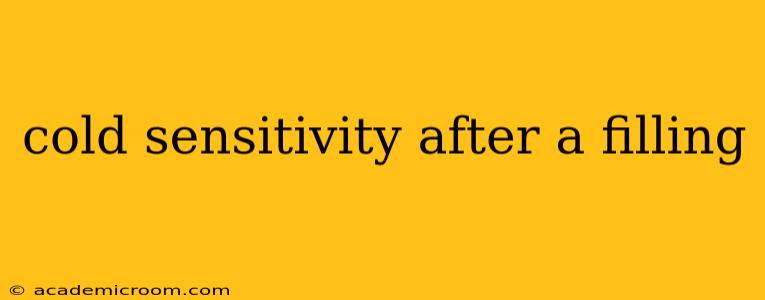Experiencing cold sensitivity after getting a dental filling is a common issue, and while often temporary, it can be quite bothersome. Understanding the causes, potential treatments, and preventive measures can help alleviate this discomfort and ensure a positive dental experience. This comprehensive guide will address the most frequently asked questions surrounding post-filling cold sensitivity.
What Causes Cold Sensitivity After a Filling?
Cold sensitivity after a dental filling usually stems from the procedure itself. The filling material, even if properly placed, can sometimes irritate the dentin (the layer of tooth beneath the enamel) leaving microscopic tubules exposed to temperature changes. This exposure makes the tooth more sensitive to cold stimuli. Other contributing factors include:
- Deep fillings: Fillings that extend close to the tooth's pulp (nerve) are more likely to cause sensitivity. The closer the filling gets to the pulp, the greater the chance of irritating the nerve, resulting in heightened sensitivity.
- Irritation of the dentin: The process of preparing the tooth for a filling, including drilling and cleaning, can temporarily irritate the dentin, making it hypersensitive to cold.
- Microleakage: In some cases, a small gap might exist between the filling and the tooth structure, allowing cold to penetrate and reach the nerve, leading to sensitivity. While rare with a well-placed filling, it's a possibility.
- Type of filling material: While uncommon, the type of filling material used can play a role. Some materials might be more likely to cause irritation than others. This is usually addressed with proper placement and material selection by the dentist.
How Long Does Cold Sensitivity After a Filling Last?
The duration of cold sensitivity varies considerably depending on individual responses and the specific situation. In many cases, sensitivity resolves within a few days or weeks as the tooth heals and adapts to the presence of the filling. However, if sensitivity persists for an extended period (several weeks or months), it's crucial to consult your dentist to rule out other underlying issues.
Is Cold Sensitivity After a Filling Normal?
Yes, experiencing some degree of cold sensitivity immediately after a filling is considered a relatively normal occurrence. The sensitivity is often mild and temporary, decreasing gradually over time. However, as mentioned earlier, persistent or severe sensitivity warrants a follow-up visit with your dentist.
How Can I Treat Cold Sensitivity After a Filling?
Several methods can help manage cold sensitivity after a filling:
- Desensitizing toothpaste: Using a toothpaste formulated to reduce tooth sensitivity can help alleviate the discomfort. These toothpastes usually contain ingredients like potassium nitrate or strontium chloride, which block the transmission of pain signals from the dentin.
- Over-the-counter pain relievers: Non-prescription pain medications like ibuprofen or acetaminophen can help reduce pain and inflammation.
- Avoiding trigger foods and drinks: Temporarily avoiding very hot or cold foods and beverages can minimize discomfort.
- Fluoride treatments: Your dentist might recommend fluoride treatments to strengthen the tooth enamel and reduce sensitivity.
What If My Cold Sensitivity After a Filling Persists?
If cold sensitivity persists for an extended period or is severe, you should schedule a follow-up appointment with your dentist. Persistent sensitivity could indicate:
- A poorly placed filling: A gap between the filling and the tooth may exist, allowing for cold penetration.
- An infected tooth: Severe or prolonged sensitivity could be a sign of infection or inflammation of the pulp.
- Other underlying dental issues: Other dental problems might be contributing to your sensitivity.
Your dentist will assess your situation, diagnose the underlying cause, and recommend the appropriate treatment, which may involve adjusting the filling, performing a root canal, or other necessary procedures.
Can I Prevent Cold Sensitivity After a Filling?
While not always preventable, several measures can minimize the risk of cold sensitivity:
- Choosing a reputable dentist: Selecting a skilled and experienced dentist significantly reduces the likelihood of complications.
- Maintaining good oral hygiene: Brushing and flossing regularly reduces the chance of cavities and the need for fillings.
- Regular dental checkups: Regular dental checkups and cleanings help identify and address potential problems early on.
This information is intended for general knowledge and informational purposes only, and does not constitute medical advice. It is essential to consult with a qualified dental professional for any concerns or issues related to your oral health. They can provide a personalized assessment and recommend the best course of action for your specific circumstances.
